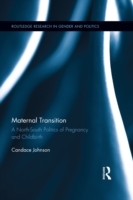What are the political dimensions that are revealed in women's preferences for health care during pregnancy and childbirth? The answers to this question vary from one community to the next, and often from woman to the next, although the trends in the Global North and South are strikingly different.
Employing three conceptual frames; medicalization, the public-private distinction, and intersectionality, Candace Johnson examines these differences through the narratives of women in Canada, the United States, Cuba, and Honduras. In Canada and the United States, women from privileged and marginalized social groups demonstrate the differences across the North-South divide, and women in Cuba and Honduras speak to the realities of severely constrained decision-making in developing countries. Each case study includes narratives drawn from in-depth interviews with women who were pregnant or who had recently had children. Johnson argues that women's expressed preferences in different contexts reveal important details about the inequality that they experience in that context, in addition to as various elements of identity. Both inequality and identity are affected by the ways in which women experience the division between public and private lives - the life of the community and the life of the home and family - as well as the consequences of intersectionality - the combinations of various sources of disadvantage and women's reactions to these, either in the form of resistance or compliance.
The rigorous and highly original cross cultural and comparative research on health, gender, poverty and social context makes Maternal Transition an excellent contribution to global maternal health policy debates.

